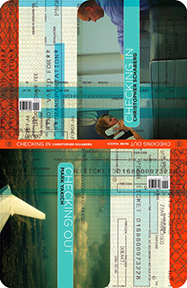When I was a child, the people who smoked at the back of the airplane were so sophisticated. They sat in the last four or five or six rows, lounging in a gray cloud of smoke that always drifted toward the front of the plane. Every section on the airplane in those days was, really, a smoking section. My mother has a strong aversion to cigarette smoke and anytime we were on a plane, which was often, she would frown and grumble about the rudeness of smokers. She’d cough, loudly, sigh.
Me, I loved to turn around and watch the smokers—men in suits, sitting with their long legs in the aisle, women with their lipstick staining the filter tip. I studied the different ways the smokers exhaled—through the nose in twin streams of gray, in a firm line from the lips, in carefully measured circles, sloppy bursts of air. I especially enjoyed how the smokers ashed their cigarettes into the little ashtray in the armrest, such a smart invention. I’ve always been fond of things that are more complicated than they first seem.
There is a moment when the airplane first leaves the ground and gravity starts to do its work. It presses down on you and your body is pulled to the back of your seat and you nearly can’t move. That moment is terrifying and exhilarating, one of the purest reminders that there is so much beyond our understanding.
I went to boarding school at thirteen years old. My parents moved around a lot because of my father’s job. I mostly enjoyed always getting to know a new place and I loved my family, but I wanted to go to the same high school for four years. I had seen enough movies to know high school would be the most important time of my life. I also wanted to run away. Junior high had been rough in ways I did not think were possible. I wanted to run away from the boy across the street, the boy I loved, the boy I thought was my friend only to learn he was anything but, the boy who took my love and tore it up and shared it with other boys he had no business sharing it with. When you run away, you always think you’re running toward something better. We need to believe we’re running toward something better to give us the courage to leave. I needed to believe I was running toward something better, a place where no one knew anything about me. I got on a plane, alone, and a flight attendant handed me a plastic set of wings. I held them in my hand and told her, “I am not a child.” She patted my shoulder and escorted me to my seat. After the plane took off, I exhaled and I smiled. I turned around to look at the smokers, sophisticated and cool, inhaling and exhaling, make it hard for anyone to breathe from within their shroud of smoke. It was a small price to pay. Of course I thought I was free.
When I flew home on breaks, I generally traveled on Eastern Airlines. They had the prettiest planes—a shiny chrome tube with a line of sky blue and a line of darker blue stretched along the fuselage. On my way home, I’d wait for my flight, my stomach knotted with all my worries. On the way back to school from wherever, I’d wait for my flight, my stomach knotted with all my worries. Throughout my teens, I was a mass of raw nerves. On the plane, though, particularly during the late flights, with the cabin dark save for a few beams of overhead light, I always felt perfectly calm, surrounded by strangers and the loud silence of a quiet airplane.
I started smoking when I was fifteen, picked up the habit at summer camp where the counselors amused themselves by corrupting the older campers once they put the younger campers to bed. I always felt cool when I smoked, and it relaxed me, the ritual of it. The knots in my stomach slowly unraveled when I lit a fresh cigarette. I smoked a lot.
I was only able to smoke on an airplane for less than a year before the government banned smoking on all domestic flights shorter than six hours. Once the plane took off, after that terrifying, exhilarating moment when gravity pressed down on me, I’d stare at the console overhead, tapping my fingers against the armrest, waiting, waiting, waiting for the NO SMOKING light to disappear. When it did, everyone in the smoking section, we worked in concert, alone but together, cigarettes at the ready, the flick of the lighter, the deep inhale, holding the sweet smoke in our chests, the collective exhale.
Roxane Gay lives and writes in the Midwest.






